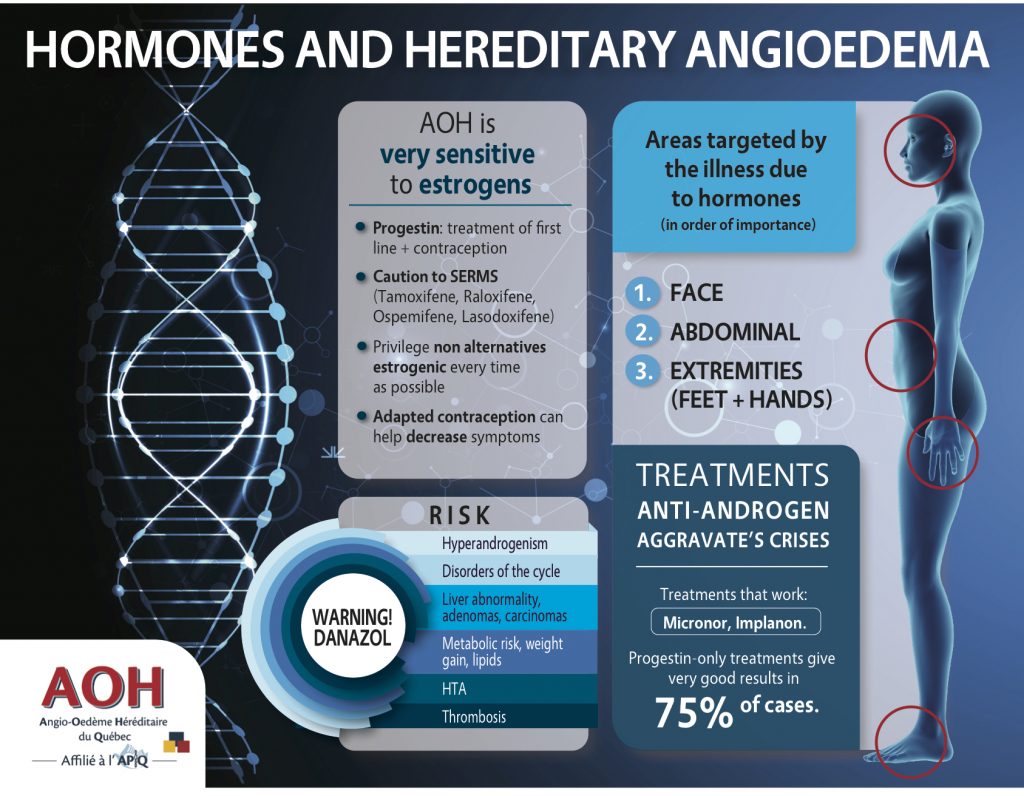TYPES OF HAE
Type I
The concentration of C1-INH is low. About 80 to 85% of people with HAE are Type I, making it the most common type of HAE. HAE type I occurs in both women and men in equal proportion.
Type II
The concentration of C1-INH is normal, but the C1-INH present is not functioning properly. About 15 to 20% of people with HAE are Type II, making it the second most common type of HAE. HAE type II occurs in both women and men in equal proportion.
Type III
The concentration of C1-INH is normal, but the individual has symptoms of HAE. This is a rare form that is not yet fully understood. Type III HAE is most commonly seen in women. More and more cases are identified.
HAE at different stages of life
If you have been diagnosed with HAE, or one of your relatives, you may have some concerns regarding the possibility of living a better, satisfying and active life. Be assured that it is possible. The majority of patients suffering from HAE are able to manage the disease with the proper medication and a healthy lifestyle.
Remember that knowledge is the key, the more you know about the repercussions , the easier it is to manage HAE.
With close follow-ups by your physician and nurses, the patient can benefit of a better quality of life.
Among children
In families affected by HAE, all children after age 2 should be tested for their C4 concentration (another protein that stabilizes their immune system and is responsible for HAE type II). Also, C1-INH should be tested.
Even if a child has no symptoms, an early diagnosis may help you prepare for future attacks.
Physicians report that their youngest HAE patients tend to be preschoolers rather than infants or toddlers. However, many people do not experience any attacks whatsoever until their teen years, or later.
If your child experiences any attack, remember that he or she has way much more difficulty conveying discomfort, pain and other symptoms. Help him or her “describe” what they are feeling and try to see if anything triggered their attacks.
During the child’s growth, help him or her identify and name the different symptoms.
If your child is diagnosed with HAE, inform the healthcare professionals at your child’s day care, school, summer camp, and after-school programs. HAE Quebec (www.aohq.ca) can supply you with a medical ID card with the following information on it; emergency phone numbers (parents and physician) and also the different emergency steps if the child is victim of an HAE attack.

Among teenagers
Hormonal and emotional changes increase during the teenage years. As result, many patients report the onset of their first HAE attack during puberty.
In addition, several individuals reported changes in the location, severity, and frequency of their symptoms and reactions as the teenage years unfold.
With the growing independence of young teenagers who spend more time away from home, it becomes even more important that they carry medical information. A medical alert identification bracelet, a card in the wallet or purse and awareness of the medical problem among the circle of close friends of the teenager.
During adolescence, complete responsibility for the child’s health must gradually shift from the parents to the teenager. Hence the importance of educating your teen as early as possible to the risks and dangers of the disease if not treated and supervised. Your teenager’s health awareness of triggers, warning signs and treatment options will help in the making of the transition to the adult world.
Among adults
Living with HAE means that you need to understand how your personal triggers initiate a crisis and how your doctor and you can best manage your HAE.
Although the causes of HAE attacks have not been definitively established, attacks are often triggered by emotional or physical trauma, surgical interventions or even minor dental procedures.
Any physiological and psychological change can cause a crisis. Hormonal variations have been associated with increased attacks in women.
Several young women report changes in the frequency and severity of their HAE attacks when using contraceptives that contain estrogen. Doctors usually recommend that women with HAE only use contraceptives that do not contain estrogen.
Other drugs may also have an impact on HAE attacks. Before you start taking a new medicine, make sure you have discussed it with your HAE specialist. If you have trouble finding an HAE specialist, please contact us (www.aohq.ca) and we will arrange for you to get a consultation within a reasonable laps of time.

